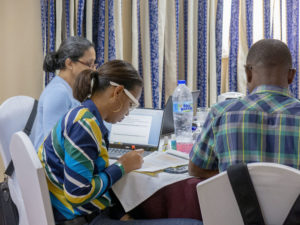Caribbean Fisheries Officers Test a Climate-Smart Fisheries Toolkit at a Training Workshop in St. Lucia

The week of October 28, ESSA’s Jimena Eyzaguirre, Natascia Tamburello, Hugh Stimson and Tim Webb delivered a five-day training workshop in Rodney Bay, St. Lucia, giving 14 Caribbean-based fisheries officers the opportunity to test out a Climate-Smart Fisheries Toolkit as part of the Pilot Program for Climate Resilience (PPCR) project.

Caribbean fisheries experts participate in a five-day training workshop in St. Lucia. Photo taken by Natascia Tamburello, ESSA.
The training session received rave reviews from participants, including Elizabeth Mohammed who joined in as an observer from Trinidad and Tobago. Ms. Mohammed offered her congratulations to ESSA, the Caribbean Regional Fisheries Mechanism (CRFM) Secretariat and the PPCR countries for delivering so comprehensively on this project, remarking, “I am astounded at the quantity and quality of the outputs”. Ms. Mohammed went on to say that “In so far as quantifying the ecological and socio-economic impacts of climate change on fisheries at a scale that is useful for countries to make climate-resilient decisions – it is indeed the first time we have done this. We now have the basic tools and a standardized monitoring framework that will allow us to refine, repeat or upscale the analyses over time, and by this means, also to assess whether we are achieving the desired outcomes and how to adapt our strategies accordingly.”
The CRFM is co-implementing the marine sub-component of the PPCR project, which is funded by the Inter-American Development Bank and executed through the Mona Office of Research and Innovation at the University of West Indies. The St. Lucia workshop was part of an assignment intended to strengthen information and stakeholder knowledge about the impacts of climate change on Caribbean fisheries, and to install a supporting monitoring system for maintaining the information and knowledge base.
Since January 2018, ESSA and our collaborators, including Dr. William Cheung (University of British Columbia), Dr. Colette Wabnitz (University of British Columbia), Dr. Gabriel Reygondeau (Yale University), Dr. Richard Boyd, Dr. Ahmed Khan, Dr. Donovan Campbell (University of West Indies), and Dr. Michael Jones (Michigan State University), have been working with the CRFM to provide the underpinning scientific expertise for the project. The team first developed detailed assessments of the ecological and socio-economic impacts of climate change on marine resources and fisheries – all based on climate modeling.
From here, the team developed a set of analytical, monitoring, and adaptation planning tools to support the use of impact assessment data in fisheries management and decision-making.
The training session in St. Lucia was designed to give Caribbean fisheries experts the opportunity to test out the relevance and usefulness of the tools and resources developed by the project team. Participants were trained in species distribution modeling; market fish supply-demand modeling; climate-intelligent monitoring; adaptation and marine spatial planning and decision making, and; storage and access to data, information and knowledge products via the CRFM Portal.
The training session also gave the Caribbean trainees an opportunity to participate in various individual and group practice exercises, including use of the freely available statistical software, R, use of freely available geographical information system software (QGIS) for marine spatial planning applications, development of customized fisheries monitoring cards, role playing with adaptation planning scenario analyses, and use of the CRFM portal being developed for managing use of the data and information base. The training also touched on communication tools for achieving behaviour changes in target groups.
More information and participant feedback is available in the press release on the CRFM’s website and the news story on The Caribbean Regional Track of the Pilot Programme for Climate Resilience website.